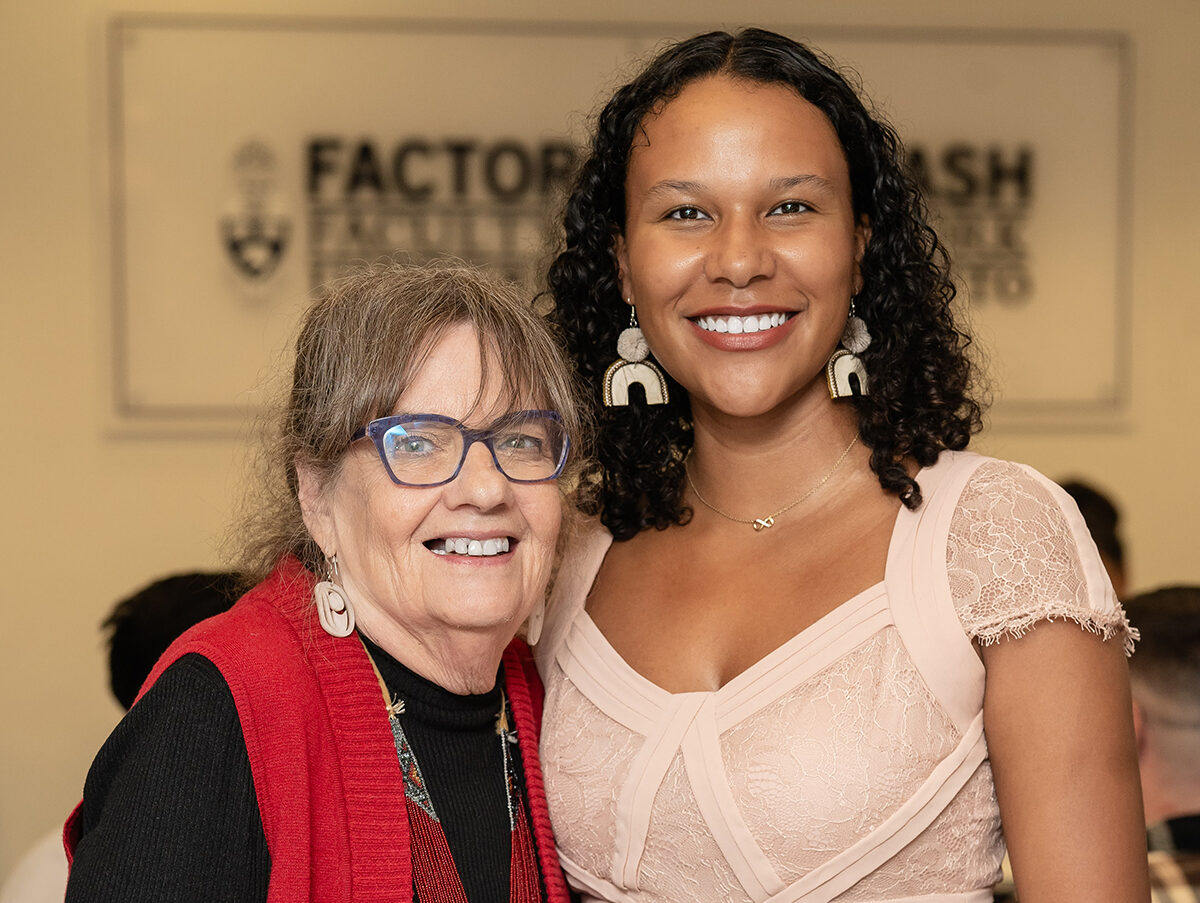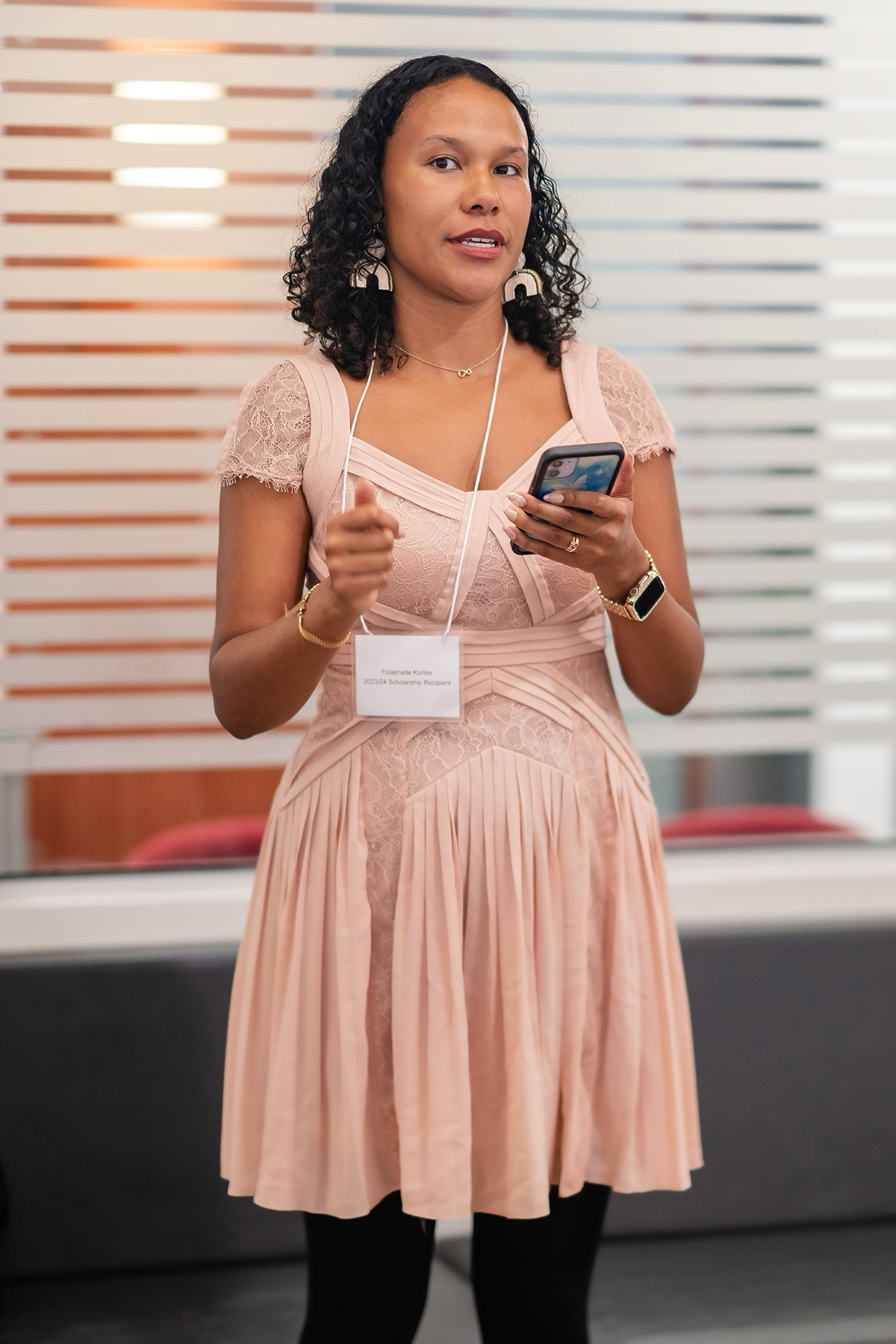The power of cultural connections
Categories: Indigenous Trauma and Resiliency field of study, Programs + Teaching, StudentsInspired by her own experience, Fall 2024 graduate Folashade Kortee is now helping Indigenous students at U of T strengthen their wellbeing and sense of belonging by connecting with their culture

Associate Professor Jane Middelton-Moz and Folashade Kortee
When Folashade Kortee discovered just how much her wellbeing increased when she connected to her roots and culture, she became passionate about giving other young people the same opportunity. The Master of Social Work – Indigenous Trauma and Resiliency (MSW-ITR) program gave her the skills and knowledge she needed, and today the new graduate is doing exactly what she set out to do.
Kortee recently started in her role as the Indigenous Wellness Counsellor and Coordinator at the University of Toronto, a job that draws on both her lived experience as a person with Métis-Cree and Nigerian heritage and the expertise she gained as an ITR student at U of T’s Factor-Inwentash Faculty of Social Work. “I’m so excited to be supporting Indigenous students with culturally relevant wellness programming,” she says.
Not long ago, Kortee believed that she was destined for a career in traditional healthcare. As a teen, she worked as a lifeguard and swim instructor and was interested in all things related to physical wellness. Then she gained a whole new perspective from a course on the social determinants of health during her undergraduate health sciences degree.
“It got me thinking about how so many people in my community are affected by how easy or hard it is to access education, healthy food, social services and culture,” says Kortee. At the same time, she was becoming more curious about her own identity. “Growing up, I sometimes found it hard to embrace my culture, even though I was interested,” says Kortee. “Often I’d be the only Indigenous and Black person in the room at school or work, so I focused a lot on fitting in.”
In 2018, Kortee’s sister invited her to join a hand drumming group with other young Indigenous women. “I felt at ease and was able to find my voice,” she says. “It affected every part of my life in a positive way.”
As she continued to explore her culture and find strength in community, one of Kortee’s mentors told her about the MSW-ITR program, which prepares graduates to help individuals, families and communities affected by historical and intergenerational trauma in culturally relevant ways. Wisdom from global Indigenous peoples and the latest scientific knowledge inform the program’s approach.
 “I immediately felt that it was what I’d been looking for, since I had a background in health sciences and was getting more and more interested in Indigenous healing practices,” says Kortee, who received support from the Fu Hui Education Foundation for her MSW studies.
“I immediately felt that it was what I’d been looking for, since I had a background in health sciences and was getting more and more interested in Indigenous healing practices,” says Kortee, who received support from the Fu Hui Education Foundation for her MSW studies.
During the two-year program, she completed two field placements working alongside Indigenous social workers delivering mental health care to Indigenous clients at the Centre for Addiction and Mental Health and Weaving Wellness Centre. ITR students come from across Canada and beyond and can complete their placements in their home communities. There are five week-long intensive sessions where students gather in person to learn together and participate in ceremonies, community building, and deep reflective learning, but the rest of the program is online.
“I had amazing placements where I learned so much, and I formed a lot of strong bonds with my classmates,” says Kortee. “An important part of the ITR program is looking at our own wellbeing and the impact of trauma, and creating a support network around each other.”
Now she’s providing support to Indigenous students at U of T as a registered social worker collaborating with a multidisciplinary health team and U of T’s First Nations House. “I’m bridging Western and traditional healing methods, just as the ITR program does,” she says.
Working in partnership with advisors and the elder-in-residence at First Nations House is a crucial part of Kortee’s role. “Getting in touch with their culture can be so integral to Indigenous students’ health and wellbeing,” she says. “It helps them recognize and use the coping skills that were always in them.”
Outside of her job, Kortee runs wellness programs for Black and Indigenous youth in the Toronto community. “Sometimes I think about how much it would have changed my life to have accessed my culture at an earlier age,” she says. “It motivates me to keep doing what I’m doing.”
Shortly before convocation, Kortee ran into Jane Middelton-Moz, a co-founder and professor in the MSW-ITR program. “I thanked her and told her how much it changed my life, giving me the confidence to take on the kinds of roles where I’m empowering other Indigenous students to improve their wellness and sense of belonging.”
Kortee says she was initially hesitant to apply to the ITR program, so she wants to encourage prospective students to take the leap. “I had imposter syndrome, thinking that U of T was so prestigious. But I know now that we need more people like me in these spaces. I hope people trust in themselves and realize they have nothing to lose and everything to gain in applying.”
By Megan Easton
 The first of its kind in North America, the Factor-Inwentash Faculty’s Master of Social Work program in Indigenous Trauma and Resiliency is dedicated to preparing advanced social work professionals to work with individuals, families and communities who have been affected by historical and generational trauma. FIFSW is deeply grateful to the Fu Hui Education Foundation for its generous support to help sustain this important program and its students.
The first of its kind in North America, the Factor-Inwentash Faculty’s Master of Social Work program in Indigenous Trauma and Resiliency is dedicated to preparing advanced social work professionals to work with individuals, families and communities who have been affected by historical and generational trauma. FIFSW is deeply grateful to the Fu Hui Education Foundation for its generous support to help sustain this important program and its students.